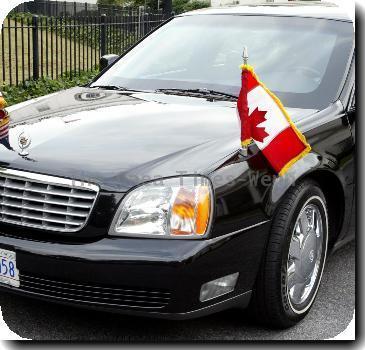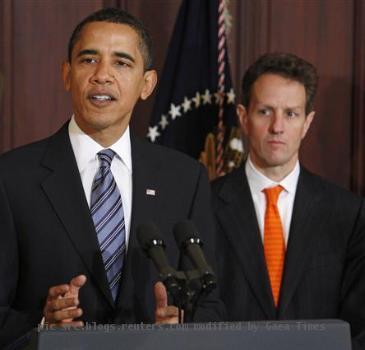Those along the Gulf Coast wait for ocean currents to decide what path massive spill will take
By Vicki Smith, APTuesday, May 4, 2010
Gulf Coast watches, waits for path of oil spill
NEW ORLEANS — Cleanup and containment of a massive oil slick resumed Tuesday as winds eased in the Gulf of Mexico and people along beaches and bayous waited to find out just how badly it might damage the delicate coast.
So far only sheens have reached some coastal waters. The oil has lingered in the Gulf for two weeks, despite an uncapped seafloor gusher. The slow movement has given crews and volunteers time to lay boom in front of shorelines, an effort stymied by choppy seas over the weekend.
Rig operator BP PLC continued to try to cap one of the smaller of three leaks, which if successful, could make it easier to install a containment system over the well.
BP’s chief executive said a containment dome designed to cover the principal leak will be on the seabed Thursday, and will be hooked up to a drill ship over the weekend.
CEO Tony Hayward stressed to reporters in Washington that the procedure had never been done before at a depth of nearly a mile below the water’s surface.
“So we’ll undoubtedly encounter some issues as we go through that process,” he said. “But if that was a good outcome, then you would have the principal leak contained by the early part of next week. But there’s no guarantees.”
The plan is to cover the leak with a 98-ton concrete-and-metal box structure known as a cofferdam, and funnel the oil to the surface. Hayward also said that chemical dispersants being used on the oil have significantly reduced the amount of oil coming to the surface.
The uncertainty has been trying for people who live along a swath of the Gulf from Louisiana to Florida. The undersea well has been spewing 200,000 gallons a day since an April 20 explosion aboard the drilling rig Deepwater Horizon that killed 11 workers. The rig was owned by Transocean Ltd.
“The waiting is the hardest part,” said Dodie Vegas, 44, who rents rooms in her Bridge Side Cabins complex in Grand Isle, the southernmost tip of Louisiana.
She said 10 guests have already canceled their rooms, worried about the oil slick.
“I understand their point. You can’t be mean about it,” she said. “That’s their week off, and if they can’t get another week, they’ve got to decide where they’re going.”
BP has been unable to shut off the well, but crews have reported progress with a new method for cutting the amount of oil that reaches the surface. They’re using a remotely operated underwater vehicle to pump chemicals called dispersants into the oil as it pours from the well, to break it up before it rises. Results were encouraging but the approach is still being evaluated, BP and Coast Guard officials said.
The latest satellite image of the slick, taken Sunday night, indicates that it has shrunk since last week, but that only means some of the oil has gone underwater.
The new image found oil covering about 2,000 square miles, rather than the roughly 3,400 square miles observed last Thursday, said Hans Graber of the University of Miami.
Fishing has been shut down in federal waters from the Mississippi River to the Florida Panhandle, leaving boats idle Monday in the middle of the prime spring season. A special season to allow boats to gather shrimp before it gets coated in oil will close Tuesday evening.
The effect on wildlife is still unclear. No oil was found on 29 dead endangered Kemp’s ridley turtles that were examined by experts after washing up on the beaches along the Mississippi coast over the past few days.
But Moby Solangi, director of the Institute for Marine Mammal Studies in Gulfport, said tissue samples would be sent off to labs for further review. Experts have warned that just because no oil is found on the turtles that doesn’t mean they didn’t consume contaminated fish or come into contact with toxins.
A second bird was also found in the oil slick and was recovering at a rescue center in Louisiana, according to National Wildlife Federation president and CEO Larry Schweiger. The brown pelican, Louisiana’s state bird, was being cared for along with a northern gannet discovered several days ago.
Schweiger said there was no way to know how many birds have been oiled because the slick is so big and offshore.
Meanwhile, crews haven’t been able to activate a shutout valve underwater. Worse, it could take three months to drill sideways into the well and plug it with mud and concrete to stop the worst U.S. oil spill since the tanker Exxon Valdez ran aground in Alaska, leaking nearly 11 million gallons of crude.
BP said Monday it would compensate people for “legitimate and objectively verifiable” claims from the explosion and spill, but President Barack Obama and others pressed the company to explain exactly what that means.
Florida Gov. Charlie Crist toured an Escambia County emergency operations center and said while the Panhandle would see the first impact from the spill, the entire state should be prepared.
“If and when it gets into the Gulf Stream, that will take it around the Gulf of Mexico potentially down to the Keys and up the Atlantic side. Now, I don’t want to be an alarmist, but I want to be a realist. And I just think we all need to be prepared to do whatever we can to protect our state. It’s precious.”
Dana Powell expects at least some lost business at the Paradise Inn in Pensacola Beach, Fla., and could see a different type of guest altogether: Instead of families boating, parasailing and fishing, workers on cleanup crews will probably be renting her rooms.
“They won’t be having as much fun,” she said, “but they might be buying more liquor at the bar, because they’ll be so depressed.”
Louisiana Gov. Bobby Jindal and other officials kept up their criticism of BP and the Coast Guard, saying they never provided plans to protect the Louisiana coast from an oil spill.
Jindal and Sen. David Vitter said local leaders have stepped in to come up with their own solutions and officials are waiting for the Coast Guard to approve the plans and BP to fund them.
“If it were up to the BP and the feds, we would not yet have plans,” Vitter said.
By all accounts, the disaster is certain to cost BP billions. But analysts said the company could handle it; BP is the world’s third-largest oil company and made more than $6 billion in the first three months of this year. The oil spill has drained $32 billion from BP’s stock market value.
Associated Press writers Frederic J. Frommer, Sarah Larimer, Mike Schneider, Jay Reeves, Jeannine Aversa, Christopher Leonard, Alan Sayre, Melissa Nelson and Allen G. Breed contributed to this report.
Tags: Accidents, Animals, Barack Obama, Birds, Coastlines And Beaches, Emergency Management, Energy, Environmental Concerns, Florida, Food And Drink, Louisiana, Mississippi, New Orleans, North America, Pensacola, Restaurants, Storms, United States, Wildlife
















